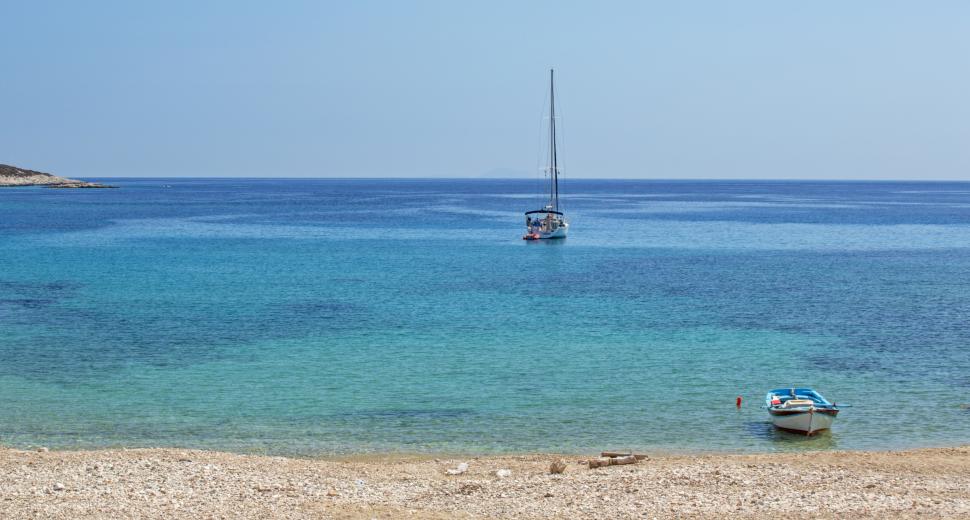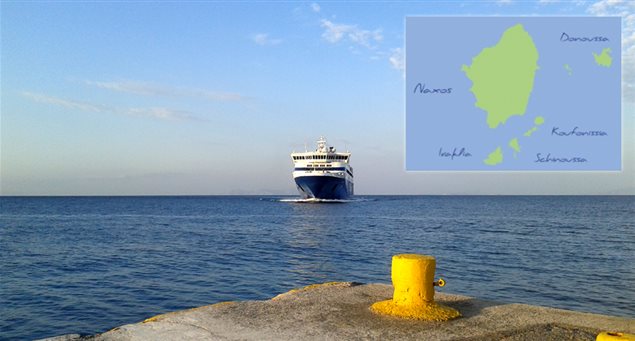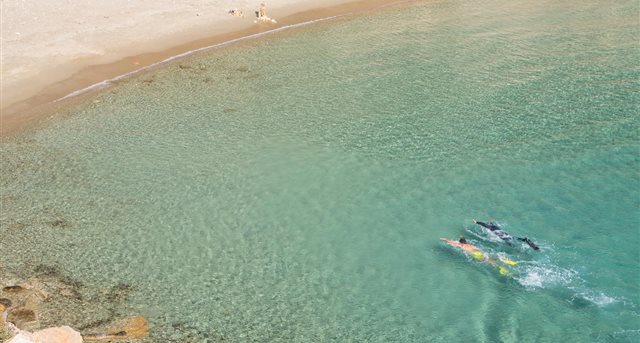
Source: https://travel.gov.gr/#/
All travellers must complete their PLF until the day before entering the country and leaving the country, providing detailed information on their point of departure, the duration of previous stays in other countries, and the address of their stay while in Greece. In case of multiple stays, they are required to provide the address for the first 24 hours at least. One PLF should be submitted per family.
Travellers will receive a confirmation email upon submission of the PLF.
Travellers will receive the PLF with their unique Quick Response (QR) code on the day of their scheduled arrival in Greece and will be notified via email (the QR code will be provided in a link in the confirmation email).
Travellers boarding or embarking on the previous day of the arrival will be allowed to do so upon showing the confirmation email, since they will receive their QR code during their flight or voyage.
The PLF can also be found on the Visit Greece app and at travel.gov.gr. It is strongly recommended that all visitors download the Visit Greece app (GDPR compliant) for free, prior their arrival in Greece.
Dear Traveler,
We welcome you to Greece and hope you enjoy a wonderful and unforgettable holiday experience.
On behalf of the Greek Government and the Greek Ministry of Tourism Cyclades we would like to inform you that we have done everything in our power to make sure you stay safe during your stay in Greece. Your health is our absolute priority.
On May 14, Greece opened its borders in a safe and attainable manner.
In the paragraphs follow, we provide a step-by-step guide on how to prepare before travelling to Greece as of May 14th.
These guidelines are in place to ensure the protection of your health, as well as the health of your loved ones and all those involved in offering you a safe hospitality experience:
– As of May 14th, travelers arriving in Greece are required to have a negative PCR certificate from a testing laboratory, for a Covid-19 test taken no later than 72 hours before arrival.
This test is mandatory for all tourists (including children over the age of 5), regardless of the epidemiological situation in the country of departure.
– Proof of a negative test is not required however for all travelers that have completed their vaccination (i.e., 14 days have elapsed since the last vaccination, depending on the doses required) and hold a vaccination certificate.
Acceptable vaccines are: Pfizer BioNtech, Moderna, Astra Zeneca/Oxford, Novavax, Johnson + Johnson/Janssen, Sinovac Biotech, Gamaleya (Sputnik), Cansino Biologics, Sinopharm.
– Proof of a negative test is not required if the traveler has recovered from COVID in the past 9 months. This can be proved through a certificate of recovery issued by a public authority or a certified laboratory. Another option is a certificate of a positive PCR molecular test result, confirming that the holder recovered from the SARS-CoV-2 virus infection, performed at least 2 months before arrival, and no later than 9 months before arrival.
– Every traveler who arrives in Greece, regardless of the certificate in their possession, may undergo a random health screening. If you are selected, please keep in mind that the screening is mandatory. In case of refusal, authorities reserve the right to refuse entry into the country. The selection is made through a targeted sampling system ”EVA” used also in the summer of 2020.
– Important clarification: Entry of tourists in Greece is not subject to vaccination. Presenting a vaccination certificate greatly facilitates the procedures upon arrival. However, in no case is a vaccination or antibodies certificate considered a “passport”.
– The countries from which entry is allowed, under the aforementioned conditions, without the requirement for subsequent self-isolation are: EU & Schengen Area countries, USA, UK, Israel, Serbia, UAE, New Zealand, Australia, South Korea, Thailand, Rwanda, Singapore, the Russian Federation, North Macedonia, Canada, Belarus, Bahrein, Qatar, China, Kuwait, Ukraine, and Saudi Arabia.
– Non EU citizens are strongly advised to choose direct flights to Greece. In any other case, travelers should abide by the stop-over country requirements.
Passengers are allowed to enter the country through all international airports and the ports of Patras, Igoumenitsa and Corfu.
Travellers are allowed to enter from the land borders through the entry gates of Promachonas and Ormenio in a 24h basis and Evzonoi from 07:00 to 23:00.
Cruising and yachting is allowed. Maritime connections with Albania and Turkey are temporarily restricted.
REQUIREMENTS FOR VISITORS
Before arrival:
– Tourists must fill in the Passenger Locator Form (PLF) no later than 23:59 (11.59 PM) of the day before arriving in Greece. For more information, please click here.
Prior to departure, all travelers must ensure that they carry an acceptable form of certification of their health condition. Acceptable documents include:
– A negative PCR molecular test result from a laboratory; the test must be taken up to 72 hours before entry.
– A vaccination certificate issued by a certified authority.
– A certificate of recovery from the SARS-CoV-2 virus infection issued by a public authority or a certified laboratory.
– A certificate of a positive PCR molecular test result, confirming that the holder recovered from the SARS-CoV-2 virus infection, performed at least 2 months before arrival, and no later than 9 months before arrival.
All certificates must include the critical information (i.e. number of doses and their respective dates) in English, German French, Italian, Spanish, Russian and the person’s full name must match the name on the passport or any other recognized travel document.
Upon arrival:
Travelers arriving in Greece are subject to:
– Sampling RAPID antigen tests at the entrance gates for selected individuals drawn from a targeted sampling system, based on the ”EVA” system.
– Mandatory isolation if they test positive for SARS-Cov-2, following a sampling test. In this case, the travelers and their travel companions are accommodated in quarantine hotels, where they will undergo further PCR testing to confirm the initial diagnosis. Guests will stay in seclusion hotels for at least 10 days. The expenses of the accommodation in quarantine hotels are covered by the Greek state.
Compliance with the health protocols during transport and throughout your entire stay in Greece is the key factor that will allow all of us to stay safe and return to normality.
We appreciate your understanding and apologize in advance for any additional inconvenience.
We extend a warm thank you for the cooperation, and for choosing our country for your holidays.
We look forward to welcoming you to Greece.
QUESTIONS AND ANSWERS FOR THE OPENING OF TOURISM 2021
- How can one travel to Greece?
Greece is ready to welcome visitors applying advanced health protection protocols. In 2021, Greek Tourism is ready to operate with the maximum safety possible, for tourists, employees and every person involved in the provision of tourist services.
Isolation (quarantine) for visitors from abroad is no longer required. However, entry into Greece will be allowed under the following conditions:
A. Travelers must have one of the following:
– Vaccination certificate issued by an appropriate body in the traveler’s country of origin.
– Instead of a vaccination certificate, travelers are required to show a negative PCR test conducted up to 72 hours before traveling.
– Alternatively, the traveler can show a certificate of recovery from the SARS-CoV-2 virus infection issued by a public authority or a certified laboratory or a certificate of a positive PCR molecular test result, confirming that the holder recovered from the SARS-CoV-2 virus infection, performed at least 2 months before arrival and no later than 9 months before arrival.
B. All visitors must complete the electronic PLF document at least 24 hours before traveling.
C. Upon entering Greece, visitors may undergo targeted tests. In the event of a positive result, travelers will be temporarily accommodated in an isolation hotel, free of charge. If a positive incident is detected following a sampling test at the land borders, then entry into the country may not be allowed.
2.What are the health protocols for the people working in the tourism sector?
Employees in the Greek tourism sector are vaccinated with the general population, according to government planning. Until their vaccination, all employees are obliged to undergo tests twice per week (self-test or rapid test). Furthermore, they are encouraged to test even more frequently, in order to ensure timely isolation.
3.Which vaccines are acceptable for the vaccination certificate?
Acceptable vaccines are: Pfizer BioNtech, Moderna, Astra Zeneca/Oxford, Novavax, Johnson + Johnson/Janssen, Sinovac Biotech, Gamaleya (Sputnik), Cansino Biologics, Sinopharm
4.What applies to international flights?
As of May 14th, flight restrictions from EU countries will be lifted, as well as from a number of other countries (USA, UK, UAE, Serbia, Israel, Australia, New Zealand, South Korea, Thailand, Rwanda, Singapore, North Macedonia, Canada, Belarus, Bahrein, Qatar, China, Kuwait, Ukraine, Saudi Arabia and the Russian Federation). Quarantine will not be required.
Furthermore, our country welcome flights at all international airports.
5.What will apply to land travel?
Travelers are allowed to enter through the entry gates of Promachonas and Ormenio in 24H basis and Evzonoi from 07:00 to 23:00.
6.What about ferry connections?
As of 14/5/21 the quarantine is lifted for passengers who arrive by ferry to the main port entrances (Patra, Igoumenitsa, Corfu). Maritime connections with Albania and Turkey are restricted.
7.How can the visitors move to or from their hotel?
If travel across counties is prohibited, guests will be able to travel from the airport to the lodging they have booked with their hotel voucher and PLF.
8.What will apply to guests during their stay?
During their stay in Greece, visitors must follow all measures that apply to Greek citizens.
9.Will there be business activity protocols?
In all tourist activities, tourist transport and tourist visits to other places of interest, the same protocols as those in 2020 will apply, with some small adjustments. These protocols have proved effective, and will be updated according to epidemiological conditions. The Ministry of Tourism and the Hotel Chamber of Greece will provide certification to all lodgings that apply these protocols. Moreover, training material will be provided to the employees of these businesses, in order to ensure the correct application of all health and safety measures against Covid-19.
10.Will there be quarantine hotels?
The plan for the opening of Greek Tourism provides for the existence of specific isolation (quarantine) hotels near each entrance gate, as well as in other strategic points nationwide. This way, an adequate safety net for case management will be in place, combined with an early detection upon the arrival of tourists from abroad. The cost for the isolations hotels are covered by the Greek state.
11.What will apply to minors under the age of 12?
Only children under the age of 5 will not be required to undergo a PCR test.
12.When will the departure and arrival of private yachts be allowed and from which countries?
The departure and arrival of yachts (except those coming from Albania and Turkey) is allowed with some restrictions, while the same terms and conditions will apply both for Greek and foreign citizens
13.What will apply to cruise ships?
From May 14th, cruise restrictions are completely removed, always enforcing very strict protocols that are applied to these activities.
14.What if the visitor’s country requires a test for his/her return?
It is possible to perform PCR or antigen tests directly at the place where each guest stays, if the guest needs a test for returning home. This makes it easier for every tourist to be consistent with his/her obligations in order to safely return to his/her country.
- The use of non-medical face masks is mandatory indoors and outdoors throughout Greece. The above restriction does not apply to:
- individuals for whom wearing a face mask is not recommended on account of their documented medical condition, e.g. respiratory problems, and
- children under the age of four (4).
- Movements are allowed daily from 05:00 to 23:00 across the country.
- Archaeological sites, museums, caves:
- Indoor cultural spaces remain closed
- Open-air spaces may be visited on the condition that
- Visitors keep a 1.5 m physical distance from each other
- One person is allowed per 10 m2 of space
- Visitors enter in groups of up to three individuals, with the exception of families (spouses / partners and children)
- Worship areas: A double face mask consisting of a non-medical and a cloth mask OR a N95 mask must be worn.
- Dining:
- Service is provided in outdoor spaces ONLY. Music reproduction is not allowed and all customers must be seated. An exception applies to restaurants, bars, and cafes operating in indoor hotel spaces and serving hotel guests only.
- An arrangement of tables and seats must be made as per the physical distancing & health protection guidelines in place.
- In bars and cafes, two customers may be seated on stools at the counter and a 1.5 m distance must be kept from the next two customers.
- Opening hours are 05:00 to 22:45.
- Customers waiting for a table must wear a face mask.
- Up to six (6) individuals are seated per table.
- Entertainment/music venues, reception areas, and boîtes remain closed.
- Live events, audio and visual art performances and other performing arts remain suspended, except for broadcasting purposes.
- Cinemas will remain closed.
- Retail businesses may sell goods to customers who:
- pre-order/pre-pay for desired items by electronic means or by phone and fix an appointment to receive / buy them outside the shop (click away), or
- fix an appointment by electronic means or by phone in order to receive / buy the desired items within the premises (click inside).
- The procedure is as follows:
- The order/appointment is taken by the shop assistant and the customer receives either an electronic document confirming the purchase / appointment, or a message containing the business name, address and Tax Identification Number as well as the delivery time
- Only one (1) person is allowed to pick up the order
- The payment may take place either electronically or by using a POS machine upon delivery at the business premises
- A minimum two (2) metre distance must be kept among customers waiting for delivery outside the premises (click away); up to nine (9) individuals are allowed to queue; and the maximum waiting time is ten (10) minutes.
- If delivery / purchase takes place inside the premises (click inside), then one (1) person is allowed per 25 m2 for indoor establishment areas up to 500 m2, and one (1) individual per any additional 50 m2 in establishments with an area larger than 501 m2. In indoor common areas the ratio is set at one (1) customer per 10 m2.
- Citizens are allowed to make their purchases in the manner described above by visiting retail establishments once every twenty four hours, technically from 00:00 until 23:59. For this particular movement, the individual sends a blank text message on their cell phone to 13032. An automated reply message will confirm that the sender is allowed to make their way to the shop(s), within a three hour span, starting from the moment the reply message was sent, on the condition that this person has not used this service again on that particular day. People must carry some identification with them (ID card or passport) and be able to show the reply message on their cell phone, confirming their purpose for going out.
In relation to the above-mentioned method of purchasing, citizens must also carry an electronic document verifying the purchase, or a message via their telecommunications service provider, related to the transaction, or other related document on the digital platform ‘e-consumer’ of the General Secretariat for Trade and Consumer Protection.
- Shops within airports are open across the country.
- Food shops, pharmacies, filling stations, pet shops, dry cleaning businesses, shops selling tobacco/ vaping products:
- One (1) person is allowed per 25 m2 in the shop main area.
- A 1.5 m distance must be maintained among individuals.
- Customers in food shops must keep a two (2) m distance among them while queueing at the checkout.
- The (optional) extended opening hours are 07:00 to 21:00 with the exception of food shops, and delivery service businesses which may be open until 01:00.
- Zoos and bioreserves: Their outdoor areas are open to visitors provided that:
- One (1) individual is allowed per 25 m2.
- A two (2) metre distance is kept among guests.
- Entry is allowed by electronic ticket only.
- Visitors enter in groups of up to three individuals, with the exception of families (spouses / partners and children).
- Transport:
- Public transpoWhat applies to the organization of conferences?rt means will run at 65% capacity and services will be limited.
- Tour buses and city sightseeing buses whether open-top or not will run at 85% capacity.
- Vehicles for public use (e.g. taxis, special hire vehicles) and private cars as well as private hire vehicles with a chauffeur may carry up to two (2) passengers in addition to the driver. An exception applies to adults with children who cannot remain at home under adult surveillance, and to individuals who are in need of a second passenger to aid them during their transport.
- Up to three (3) persons in addition to the driver can ride in double-cab pick- ups, mixed used vehicles and vans. This number may be higher if there are children on board who cannot remain at home under adult surveillance.
- Wearing a face mask is not mandatory for drivers, as single passengers, or when the other passengers are their spouses / partners and 1st and 2nd degree relatives.
- Conferences / Exhibitions are suspended.
- Amusement parks, theme parks, beaches / beach services / umbrella hiring and or beach chairs services.
- Following an entrance check, up to eighty (80) individuals are allowed per 1000 m2 of beach area.
- Up to two (2) persons and chaise longues, or beach chairs are allowed per umbrella, with the exception of families.
- Cruising:
It is forbidden for cruise ships, irrespective of their flag, to enter Greek ports for the purpose of cruise sailing. Exceptions apply to cruise ships which navigate Greek waters for the following reasons: Cruise sailing may take place without entering any ports of call during the voyage (blue cruising). Cruise ships may leave from the ports of Piraeus, Herakleion, Rhodes, Corfu, Volos, and Katakolo ONLY. In this case, these vessels may conclude their cruising either at their home port or at one of the other ports mentioned above. Access to other ports of call in Greece or abroad during the voyage is forbidden. During the cruise, while boarding and disembarking, the passengers, captains, crew members, ship owners or ship owning companies and port administration agencies, as well as any other person with related duties, are required to abide by the Ministry of Health circular No. Δ1β/Γ.Π.οικ.47415/24.7.2020 titled “Guidelines on the effective management of new Covid-19 cases aboard cruise ships”.




